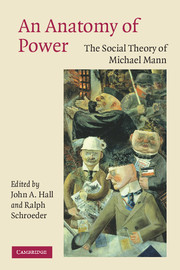Book contents
- Frontmatter
- Contents
- List of figures
- List of contributors
- 1 Introduction: the IEMP model and its critics
- Part I Theory, practice, method
- 2 Mann's transformation of the classic sociological traditions
- 3 Political questions
- 4 Mann's microfoundations: addressing neo-Weberian dilemmas
- 5 Grand, yet grounded: ontology, theory, and method in Michael Mann's historical sociology
- Part II Types of power
- Part III European exceptionalism?
- Part IV Promise and perils of modernity
- Part V Response
- Bibliography of Michael Mann's Writings
- Index
- References
4 - Mann's microfoundations: addressing neo-Weberian dilemmas
Published online by Cambridge University Press: 22 September 2009
- Frontmatter
- Contents
- List of figures
- List of contributors
- 1 Introduction: the IEMP model and its critics
- Part I Theory, practice, method
- 2 Mann's transformation of the classic sociological traditions
- 3 Political questions
- 4 Mann's microfoundations: addressing neo-Weberian dilemmas
- 5 Grand, yet grounded: ontology, theory, and method in Michael Mann's historical sociology
- Part II Types of power
- Part III European exceptionalism?
- Part IV Promise and perils of modernity
- Part V Response
- Bibliography of Michael Mann's Writings
- Index
- References
Summary
Most historical sociologists study macro-level outcomes, explain them using macro-level causes, and test their arguments using macro-level data. Although all of these scholars realize that individual action brought about these outcomes, and few believe that these individuals are either just bearers of social structure or cultural dopes, explicit discussions of individual motivation and action are rare in historical sociology.
One obvious reason for the lack of focus on micro-level causal mechanisms is that it is especially difficult in historical sociology. When actors are more distant from us in time and space, it is harder both to theorize (make assumptions) about their motives and to get any empirical data about them. The classical sociologist who most explicitly addressed the difficult issue of the motives of historical actors was Max Weber, and contemporary neo-Weberians (along with a handful of rational choice theorists) have been most likely to follow his lead. This chapter explores the microfoundations used by one of the most prominent and accomplished neo-Weberian historical sociologists, Michael Mann.
Weberian historical sociologists who address the problem of microfoundations face two dilemmas. First, how can they use multiple micro-level causal mechanisms (Weber's four types of social action or something similar) without making their arguments tautological? The problem here is the same as that of tautology in rational choice models that do not specify preferences a priori – with many different microfoundations allowed, any action can be ‘explained’ after the fact.
- Type
- Chapter
- Information
- An Anatomy of PowerThe Social Theory of Michael Mann, pp. 56 - 70Publisher: Cambridge University PressPrint publication year: 2006
References
- 4
- Cited by



